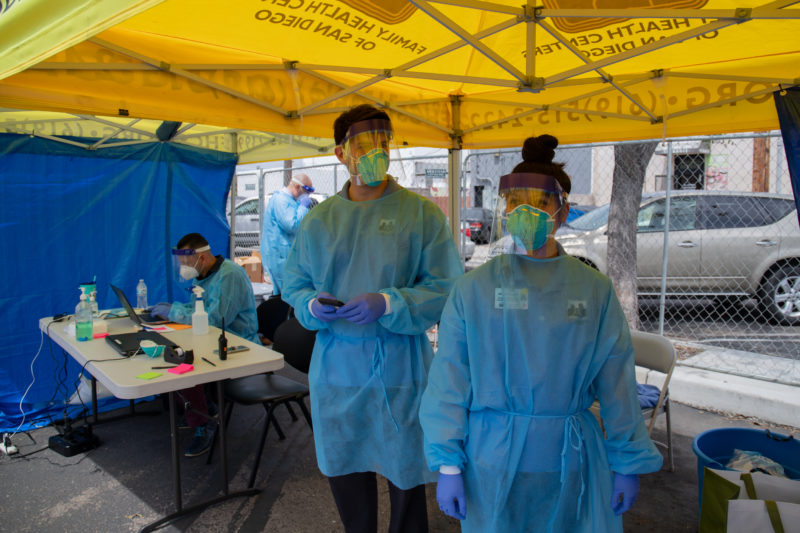Two detention officers are suing the Otay Mesa Detention Center, the U.S. government is lobbying to reopen Mexican factories and more in our biweekly roundup of border news.

Health care workers with Family Health Centers of San Diego stand ready to help out patients at a coronavirus testing center in Chula Vista. / Photo by Adriana Heldiz
The border is taking a leading role in the region’s conversations about how to slow the spread of the coronavirus.
Not only are South Bay ZIP codes showing a higher number of cases, but a far greater share of coronavirus tests administered to patients there are coming back positive.
Tijuana has been hit hard by COVID-19. The city has the some of the highest numbers of coronavirus-related deaths per capita in Mexico at 173. As of Sunday, Baja California had a total of 1,660 confirmed cases. An analysis by the magazine Zeta found that the state’s working class has been hit particularly hard. Dozens of coronavirus victims are being buried in an already-packed graveyard in Tijuana, the San Diego Union-Tribune reports.
County officials and hospital leaders have started sounding the alarm. They’ve asked the U.S. government for assistance to help Mexico respond to the crisis, and help San Diego prevent and prepare for a larger spillover from across the border. The biggest concern is the approximately 265,000 U.S. citizens who live in Baja California and who may come to San Diego to seek health care.
I sent some questions to Justine Kozo, chief of San Diego County’s Office of Border Health, about how the two regions are working on this crisis. Kozo said she and other officials are in constant communication with their counterparts in Mexico, which includes biweekly calls featuring epidemiology updates from Tijuana, Tecate and Rosarito. Her answers have been lightly edited for clarity and length.
How is COVID-19 different than other infections and public health concerns that you’ve worked on across the border?
Due to the nature of our dynamic region, any time we see an increase in cases in San Diego, most likely Tijuana will also experience an increase as well. We have seen this happen in the past, including during the rise of meningococcal disease in our region in 2013. On an average day before COVID-19, there were over 140,000 border crossings, with people crossing for shopping and recreation, employment, school, health care and to see loved ones. In our current COVID-19 environment, cross-border traffic is more limited but substantial essential cross-border travel continues. We are an interconnected, interdependent community, and that inevitably interplays with disease spread. The difference with COVID-19 is that Tijuana is facing a different kind of crisis. While San Diego is reviewing its various indicators and metrics to possibly dial down restrictions, just a few miles south of us, Tijuana is experiencing immense challenges, including shortages of personal protective equipment and ventilators, tests, health care personnel and a lack of hospital beds and staff to care for sick patients. Their hospitals are at or near capacity.
How do the COVID-19 situations differ right now between San Diego and Tijuana?
While [Tijuana] may have shortages in [personal protective equipment], it’s on a different scale. And our hospital system in San Diego still has capacity to care for a substantial increase in patients. In terms of number of cases in Tijuana, they are still reporting relatively low numbers, but because of the shortage of testing equipment, the reported cases are greatly undercounted.
What does contact tracing look like across the border right now? How do public health officials investigate COVID-19 clusters and cases that may have ties across the border?
The health departments on both sides of the border notify each other when exposure occurs. The county is bringing on board increased personnel to conduct contact tracing. We are in daily communication with the California Department of Public Health, Office of Binational Border Health and their Border Infectious Disease Surveillance Program. They work in close collaboration with the county of San Diego epidemiology program and Imperial County’s epidemiology program on binational case investigation and reporting.
Kozo also noted that the county is trying to facilitate fundraising with the International Community Fund to provide more personal protective equipment and other resources to Tijuana’s hospitals. If you’d like to donate to the fund, you can do so here.
It’s Not Just Detainees Who Don’t Feel Safe at Otay Mesa
Two detention officers at Otay Mesa Detention Center have filed lawsuits against CoreCivic, the company that runs the facility, for failing to take reasonable steps to protect their health amid the pandemic, the Union-Tribune reports. Federal detainees at Otay Mesa also told the U-T that they aren’t being isolated while awaiting coronavirus test results. As of Friday afternoon, 174 people in custody at the facility had tested positive for COVID-19.
Meanwhile, a San Diego federal judge ordered Immigration and Customs Enforcement to review for possible release a list of detainees at the Otay Mesa Detention Center who would be at high risk for serious coronavirus symptoms, the U-T reports.
Medium also published an account from a Honduran man inside the Otay Mesa Detention Center explaining why detainees are on hunger strike: “I’ve never participated in anything like this, but I’m afraid of dying in here.”
Controversy Over Mexican Factory Operations Continue
Even as coronavirus deaths mount at Mexican factories, the Los Angeles Times reports that the United States has continued to press the Mexican government to reopen many factories that closed because of social distancing rules.
There are an estimated 1,000 maquiladoras in Baja California — mostly in Tijuana and Mexicali — but only 350 have been allowed to continue operating through the COVID-19 crisis. Some of the maquiladoras that were forced to close after being declared non-essential have re-opened without permission, but the news site Border Report reports that state officials say they have no way of monitoring the businesses.
A group of U.S. senators, including California Sen. Dianne Feinstein, sent a letter to Secretary of State Mike Pompeo urging him to request that the Mexican government clarify its definition of essential businesses to resolve any uncertainty in the U.S.-Mexico supply-chain. The San Diego congressional delegation sent a similar letter to Pompeo and the Mexican ambassador to the United States.
Border Patrol’s Own Coronavirus Battle
An Indian man apprehended by Border Patrol near Calexico tested positive for COVID-19. He was the first person in CBP custody to test positive so far, according to the agency.
Border Patrol is increasing coastal patrols, as coastal smuggling has been undeterred amid the pandemic. Since Oct. 1, the agency has had 129 maritime smuggling incidents. There were 194 in all last fiscal year, the Times of San Diego reports.
More Border News
- An estimated 60 million gallons of sewage have flown into the Tijuana River daily for the past six months. (CBS8)
- Fears of a COVID-19 outbreak in Tijuana prisons loom. One woman says her father, who is detained in Tijuana’s La Mesa Penitentiary facility, was taken to the hospital with severe respiratory issues that are likely related to the coronavirus, but she has been unable to get any information from the facility’s director. (El Sol de Tijuana)
- The pandemic hasn’t slowed violence in Tijuana. The first day of May saw eight registered homicides in different parts of the city. As of May 2, there have been 669 homicides so far in 2020. (Zeta)
- A water main break is causing water outages in 18 colonias. (El Sol de Tijuana)
- The president’s chief adviser on immigration, Stephen Miller, has long tried to halt migration based on public health, without success. But the coronavirus pandemic has created an opening for some of Miller’s longstanding policy goals, like finding a way to quickly deport children who come to the United States without a guardian. (New York Times)
- It’s almost impossible to find beer in Tijuana. (Union-Tribune En Español)
And the Pulitzers Go to …
Some incredible work about the border was awarded Pulitzer Prizes on Monday, including a podcast on the Trump administration’s so-called “Remain in Mexico” policy, and the nonfiction book “The End of the Myth: From the Frontier to the Border Wall in the Mind of America.” The latter is about how the border wall has become a rallying point because similar to other moments in America’s history, it has helped deflect domestic political and economic conflicts outward.
[Disclaimer]










